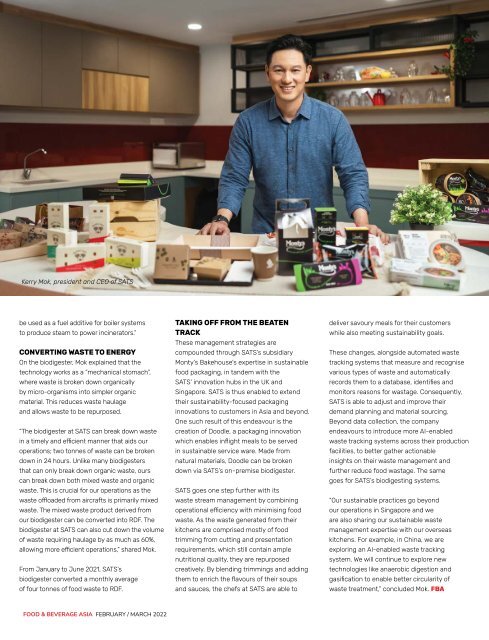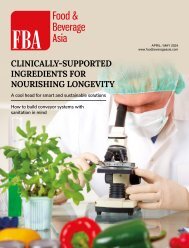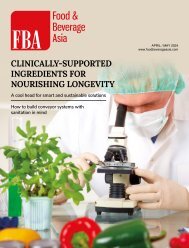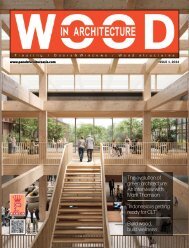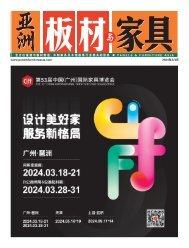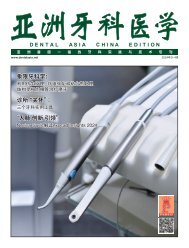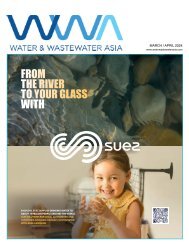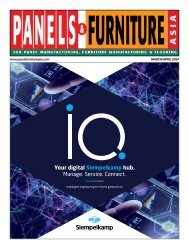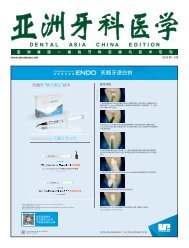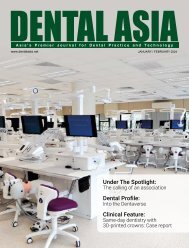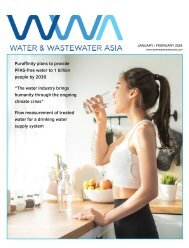Food & Beverage Asia February/March 2022
Food & Beverage Asia (FBA) is the leading source of food and beverage news in Asia since 2002. FBA delivers a comprehensive view of the food and beverage landscape, spanning across the latest health and nutrition trends and industry innovations in ingredients, recipe formulations, food science, sustainability, packaging, and automation, as well as advancements in agri and food-tech.
Food & Beverage Asia (FBA) is the leading source of food and beverage news in Asia since 2002. FBA delivers a comprehensive view of the food and beverage landscape, spanning across the latest health and nutrition trends and industry innovations in ingredients, recipe formulations, food science, sustainability, packaging, and automation, as well as advancements in agri and food-tech.
Create successful ePaper yourself
Turn your PDF publications into a flip-book with our unique Google optimized e-Paper software.
32<br />
ON THE TABLE<br />
Kerry Mok, president and CEO of SATS<br />
be used as a fuel additive for boiler systems<br />
to produce steam to power incinerators.”<br />
CONVERTING WASTE TO ENERGY<br />
On the biodigester, Mok explained that the<br />
technology works as a “mechanical stomach”,<br />
where waste is broken down organically<br />
by micro-organisms into simpler organic<br />
material. This reduces waste haulage<br />
and allows waste to be repurposed.<br />
“The biodigester at SATS can break down waste<br />
in a timely and efficient manner that aids our<br />
operations; two tonnes of waste can be broken<br />
down in 24 hours. Unlike many biodigesters<br />
that can only break down organic waste, ours<br />
can break down both mixed waste and organic<br />
waste. This is crucial for our operations as the<br />
waste offloaded from aircrafts is primarily mixed<br />
waste. The mixed waste product derived from<br />
our biodigester can be converted into RDF. The<br />
biodigester at SATS can also cut down the volume<br />
of waste requiring haulage by as much as 60%,<br />
allowing more efficient operations,” shared Mok.<br />
From January to June 2021, SATS’s<br />
biodigester converted a monthly average<br />
of four tonnes of food waste to RDF.<br />
TAKING OFF FROM THE BEATEN<br />
TRACK<br />
These management strategies are<br />
compounded through SATS’s subsidiary<br />
Monty’s Bakehouse's expertise in sustainable<br />
food packaging, in tandem with the<br />
SATS' innovation hubs in the UK and<br />
Singapore. SATS is thus enabled to extend<br />
their sustainability-focused packaging<br />
innovations to customers in <strong>Asia</strong> and beyond.<br />
One such result of this endeavour is the<br />
creation of Doodle, a packaging innovation<br />
which enables inflight meals to be served<br />
in sustainable service ware. Made from<br />
natural materials, Doodle can be broken<br />
down via SATS’s on-premise biodigester.<br />
SATS goes one step further with its<br />
waste stream management by combining<br />
operational efficiency with minimising food<br />
waste. As the waste generated from their<br />
kitchens are comprised mostly of food<br />
trimming from cutting and presentation<br />
requirements, which still contain ample<br />
nutritional quality, they are repurposed<br />
creatively. By blending trimmings and adding<br />
them to enrich the flavours of their soups<br />
and sauces, the chefs at SATS are able to<br />
deliver savoury meals for their customers<br />
while also meeting sustainability goals.<br />
These changes, alongside automated waste<br />
tracking systems that measure and recognise<br />
various types of waste and automatically<br />
records them to a database, identifies and<br />
monitors reasons for wastage. Consequently,<br />
SATS is able to adjust and improve their<br />
demand planning and material sourcing.<br />
Beyond data collection, the company<br />
endeavours to introduce more AI-enabled<br />
waste tracking systems across their production<br />
facilities, to better gather actionable<br />
insights on their waste management and<br />
further reduce food wastage. The same<br />
goes for SATS’s biodigesting systems.<br />
“Our sustainable practices go beyond<br />
our operations in Singapore and we<br />
are also sharing our sustainable waste<br />
management expertise with our overseas<br />
kitchens. For example, in China, we are<br />
exploring an AI-enabled waste tracking<br />
system. We will continue to explore new<br />
technologies like anaerobic digestion and<br />
gasification to enable better circularity of<br />
waste treatment,” concluded Mok. FBA<br />
FOOD & BEVERAGE ASIA FEBRUARY / MARCH <strong>2022</strong>


